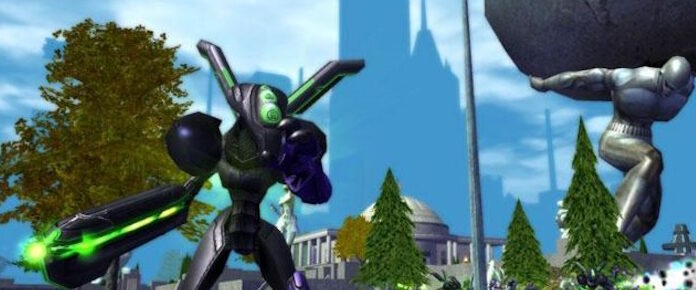
A few weeks ago, Massively OP’s Eliot Lefebvre wondered aloud about which MMO has had the best year so far. For this week’s Overthinking, I’d like to expand that a bit and ask which games are the biggest and best and most important and influential this year on the whole. Instead of asking our writers to pick one, I’m asking them to pick three games that represent the MMORPG zeitgeist, using whatever combination of criteria they wish — revenue, playerbase size, hype, anticipation, update cycle, and so forth. What should we be paying attention to? Which games are a sign of the times? And just who is dominating in 2016?

Andrew Ross (@dengarsw): I think we should be paying attention to Crowfall. Chronicles of Elyria has a lot in planning, but there’s so little out there right now, I’ll put that one off to 2017. For this year, in terms of doing something unique in the MMO sphere (especially in terms of PvP), we need to see how Crowfall does. As the genre’s gotten bigger, it feels as though the MMOs need to get smaller to keep players’ attention, and Crowfall is doing just that. It’s success or failure will say a lot about the use of modern instancing, semi-persistent worlds, and the PvP conquest scene.
This is also why I feel like, in terms of released games, what Star Wars: The Old Republic does is highly relevant to the industry as a whole. What both tempted and repulsed me from it is the emphasis on developer lead story. The game is practically the definition of massively singleplayer gameplay, something that certainly has helped make this genre more appealing and accessible, but also making the former kinds of gameplay experiences the old guard reveres as nearly impractical. There’s a lot about the game I know I personally liked and wish I could get into it more, but it’s success is something that makes it difficult for me to argue what is or is not an MMO.
Landmark can’t be ignored, mostly because it’s all we have left of EverQuest Next, and Daybreak needs to win back the public in a big way. I don’t think it’s going to get the attention it needs, mostly because it’s dropped the official EQ name. Even if Daybreak is planning to do something with some of the key development assets and systems developed for EQN, Landmark is the most MMO release coming out from one of the oldest MMO companies we have. Failing to impress the masses is going to count for something. If they do impress though, it’s certainly renew people’s faith in the company, especially after the H1Z1 split.

Brianna Royce (@nbrianna, blog): Narrowing this list down to three is hard, mostly because I can think of some good reasons to exclude every single major MMO from contention thanks to controversies, content lapses, or both. But here we go:
Star Wars: The Old Republic: Riding high from the boost brought by The Force Awakens, SWTOR has been pumping out content and making money hand over fist. You might not like the content, but it’s producing it — more than I can say for some other big games.
The Elder Scrolls Online: We’ve been officially banned from saying that ESO’s most recent DLC makes it the game it should have been when it launched, but it’s true. The game was barebones at launch but is fully fleshed out now with major content chunks for multiple playstyles and an overhaul of hated systems. It’s also leading the charge of MMOs branching out to consoles, which you might see as a bad thing, but I see it as a money for our genre, period.
Black Desert Online: I have to echo Justin below me here and say that while I was personally unimpressed with BDO, it demonstrates that sandbox content is very much desired in 2016, which I hope has a profound effect on a genre otherwise obsessed with trite themepark grinders and empty survival gankboxes. If it can just get the cheating and hacking mopped up, it’s going to stay the pre-eminent MMORPG sandbox for quite a while to come.

Eliot Lefebvre (@Eliot_Lefebvre, blog): I suppose “drawings of Overwatch characters in a setting with actual narrative considerations for the characters” doesn’t count as part of the zeitgeist in this context, does it? No? All right, then. Narrowing it down to three actual MMOs is still pretty easy.
The first is also insultingly obvious: World of Warcraft. The game is an establishment. It’s the status quo. Ironically, for a game that really disrupted the standard when it was first released, it has now become the exact institution it once railed against. Most everyone has played it, everyone has an opinion on it, and you can’t get away from it. It’s indisputably still a big deal, and it’s still in the top seat, but there’s still a lot of questions being asked about its long-term sustainability. The fact that the designers seem to be content to let it languish for more than a year between updates isn’t helping anything, either.
The second is probably a bit less obvious, though, because I’d honestly toss that bone to Destiny. It’s a game that inspires a lot of people to debate over whether or not it is an MMO (it is), but it’s also one that also shows some of what can be done with the basic format in a different way. No, it’s not as feature-rich or fleshed-out as some people might prefer, including me, but it also touches into the whole pseudo-MMO space that many games have driven into over the past few years.
Last but not least is Final Fantasy XIV. Yes, I admit this is probably my favorite game on the market at the moment, but that’s because it does so much right, and even the bits it does wrong are on a shorter list. It’s a counterpoint to WoW’s institutional nature and the idea that WoW can’t implement certain features or provide faster updates; the game releases major patches like clockwork, it keeps growing in playerbase, it sets benchmarks and then surpasses them. I see FFXIV brought up often as a counterpoint to WoW, showing what can be done with the same basic tools, and I think it’s an excellent model for future games to emulate – even if it’s also the product of an intensely driven and gifted staff, which isn’t easily replicated.
Ultimately, I don’t know if you can distill the entire industry down to three games, but I think these three are all important to watch and understand. Then again, maybe we should just go with drawings of D. Va as a giant gamer nerd in a mech. It’s a tough call.

Justin Olivetti (@Sypster, blog): Black Desert Online: While discussion swirling around this sandbox import might have died down a bit in the past month, it’s still had a really impressive debut and following in the west. As with the initial interest in ArcheAge, Black Desert has proven that there’s a hunger out there for a wider, more varied MMO that isn’t merely a combat simulator. Plus, looking pretty doesn’t hurt.
World of Warcraft: Diminished subs or no, WoW is poised to have a strong year with the launch of the expansion and the motion picture adaptation. Even the alpha was huge news from the start of 2016 onward, and if Blizzard can crack its endgame conundrum with by copying Guild Wars 2’s shifting event system, then it could end the year just as big if not bigger.
Chronicles of Elyria: I honestly didn’t expect to see any new “big” MMORPG Kickstarters following Crowfall’s campaign in early 2015. Maybe Elyria is trying to promise too much with a too-small studio, but there’s hunger and ambition here that paid off with a zesty Kickstarter that went well over its goal even without a recognizable IP or star developer attached. That’s certainly worth noticing and gives me hope that the MMO community isn’t quite as dead as some claim — perhaps just dormant, waiting in hibernation until the industry starts putting out serious effort again.
Your turn!














